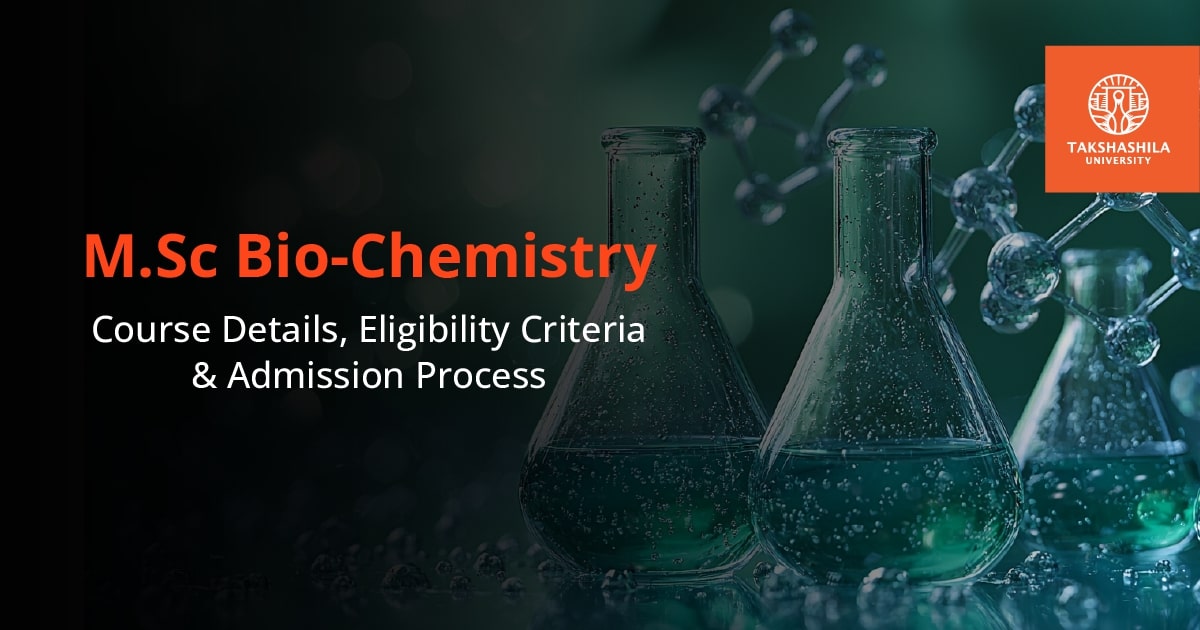Introduction to M.Sc Bio-Chemistry
M Sc Bio Chemistry is a postgraduate program that integrates the study of chemical processes and substances in living organisms. This interdisciplinary field combines Biology and Chemistry, covering advanced topics like Molecular Biology, Enzymology, and Genetic Engineering. At Takshashila Engineering College, the program is designed to provide students with both strong theoretical foundations and hands-on practical skills essential for careers in research, healthcare, pharmaceuticals, and related industries.
In this article, let’s examine all the details about M.Sc Bio-Chemistry : Course Details, Eligibility Criteria, and Admission Process

Overview of the M.Sc Bio-Chemistry Course
The M.Sc Bio-Chemistry course is designed for students over two years with 4 semesters. It combines theoretical coursework with hands-on laboratory procedures. Students delve into advanced studies such as protein chemistry, bioinformatics and metabolic pathways and develop applications of several analytical techniques. This program helps students interested in doing research and can utilise their findings to address biological and medical issues.
Key Concepts in Bio-Chemistry
Apart from these essential topics, the curriculum further emphasises in-depth and specialist knowledge in the critical areas of biochemistry concerning:
- Molecular Biology: Biomolecular focus such as DNA, RNA and protein.
- Enzymology: Enzyme kinetics, associated functions and valuable applications.
- Cellular Biochemistry: Metabolic pathways and processes at the cellular level.
- Analytical Techniques: Chromatography, Spectroscopy and Electrophoresis.
- Biotechnology Applications: The role of biochemistry in genetic engineering, drug development and the diagnostics process.
Emerging Fields in Bio-Chemistry
The program best prepares its understudies to step into the world of:
- Genomics and Proteomics: Studying genetic information and proteins linked through their interactions.
- Pharmacogenomics: Genetic-based drug therapies.
- Environmental Biochemistry: Understanding biochemical factors that affect environments.
- Clinical Biochemistry: Biochemistry methods are used in diagnosing and monitoring diseases.
Career Opportunities in Bio-Chemistry
Students who have graduated with an M.Sc in Bio-Chemistry have various career options.
- Research Scientist: Carrying out research in academic or any industrial or governmental laboratories.
- Clinical Biochemist: Experts in analysing body fluids to diagnose and monitor diseases.
- Pharmaceutical Analyst: Responsible for researching and developing new drugs into markets and their purpose.
- Biotechnology Expert: Focus on genetic engineering and the application of industrial biotech.
- Environmental Scientist: Focusing on environmental issues like pollution and conservation of biodiversity.
Research and Laboratory Roles
Practical experience is the bulk of training in this programme, and graduates often work in:
- Diagnostic laboratories in which biochemical methods are employed in clinical settings.
- Research institutes in the area of molecular biology or drug discovery.
- Industrial establishments engaged in biotechnology and chemical manufacture in process engineering.
Industrial Applications
Biochemistry MSc professionals work in:
- Healthcare: In areas of diagnostic and treatment development.
- Food and Agriculture: Biochemical means of increasing the productivity of crops and food safety is required.
- Biotechnology Firms: In attempts to develop biofuel, vaccines, enzymes and many other products.
Eligibility Criteria for M.Sc Bio-Chemistry
Academic Requirements
- An undergraduate degree in biochemistry, biology, chemistry or any other relevant field with a minimum of 50%-60% aggregate scoring
Age and Other Considerations
- There are usually no specific age limits, but shortcomings in academic conditions must be satisfied.
Skills Required for Bio-Chemistry Students
- Analytical workflow and concentration capacity.
- Skills in lab work and making use of complex devices.
- A sound knowledge of biology and chemistry.
Admission Process for M.Sc Bio-Chemistry
Entrance Exams and Application Process
- Mode of Application Submission: Candidates must submit their application using the official online website of Takshashila Engineering College.
- Examinations for Entrance: There might be an entrance or admission test that comprises and tests basic knowledge in chemistry and biology and a reasoning test.
- Interview: Applicants who qualify for the shortlisting process of selection may then have to attend an interview, where they will be asked questions relating to their motivation and aptitude for the program.
Curriculum and Course Structure
The aim was to ensure that the students were introduced to the complexities of the biochemical field and its applications gradually.
Year-wise Breakdown of Subjects
- Year 1: Advanced Biochemistry, Molecular Biology, Bio-Analytical Techniques, Practical Training.
- Year 2: Enzymology, Genetic Engineering, Bioinformatics, Research
Top Institutions for M.Sc Bio-Chemistry
While Takshashila Engineering College stands out for its comprehensive approach, other notable institutions offering M.Sc Bio-Chemistry include:
- Jawaharlal Nehru University
- University of Hyderabad
- Indian Institute of Science (IISc)
Scope and Future of Bio-Chemistry Graduates
The realm of biochemistry is huge here, and graduate students will be able to engage in Innovations in drug creation and individualized therapy approaches.
- Advancement in eco-friendly technology and practices through renewable sources of energy.
- Innovative work in molecular and synthetic biology.
Laboratory and Practical Training
Having a good understanding of the theory is good, but the practical side of it is where real fun lies, and challenges must be able to contend with both sides. Further Study and Research Opportunities In such a case, they are encouraged to advance further. She cannot do it directly, so she might consider undertaking a PhD in any of the biochemistry or other related subjects: bioinformatics or clinical molecular diagnostics. Molecular biology is best placed to be enhanced in Bio-chemistry studies rather than microbiology or biotechnology.
Benefits of Studying Bio-Chemistry
- Chances to solve the significant problems in health, ecology, and business.
- Integrated course and combination of biology, chemistry and technology.
- This means there is a high demand for professionals in the different sectors of the economy.
Challenges Faced by Bio-Chemistry Students
- Skills graduates possess after studying The use of biochemistry to solve some of the most pressing problems in health, environment, and industry—an understanding of biology, chemistry, and a bit of technology.
- Many industries are looking for professionals who can be trained as bioscientists. Issues Encountered by Biochemistry Students Almost everything in the world today is changing very fast, so this becomes a challenge for biochemistry students.
Postgraduate and Research Opportunities
Graduates can pursue further education, such as:
- Doctorate in Biochemistry OR related disciplines.
- Bioinformatics, clinical diagnostics certification, or molecular biology certification.
Comparison with Other Life Sciences Degrees
Compared to microbiology or biotechnology, biochemistry focuses more on chemical processes and molecular mechanisms, offering unique insights into the building blocks of life.
Conclusion
For those eager to explore and utilise the chemical components of life, the M.Sc Bio-Chemistry program is second to none. As the program emphasises theory and practical aspects, it enables the learners to opt for several advantageous careers in science, industry, or research. At Takshashila Engineering College, the students are trained in tandem with the best in the world, which only ensures that they will thrive in an ever-growing and progressive field.
If you want to know more about M.Sc Bio-Chemistry : Course Details, Eligibility Criteria, and Admission Process!
FAQ
Q1: How long does it take to complete the M.Sc Bio-Chemistry program?
A1: It is a program that lasts for two years and four semesters.
Q2: What are the criteria for qualification?
A2: Possession of 50-60 per cent aggregate marks in a Bachelor’s degree in Bio-Chemistry, Chemistry, Biology or a related field.
Q3: What career choices are available after completing this course?
A3: Some career choices include research scientist, clinical biochemist, pharmaceutical analyst and biotechnology.
Q4: Do students undergo practical training as part of the course?
A4: Yes, there is a lot of practical training, particularly lab work in the course.
Q5: Can the student undertake any research programs or projects after the course?
A5: Students may certainly uh.D programs or advanced certifications in bio-chemistry advanced concepts






